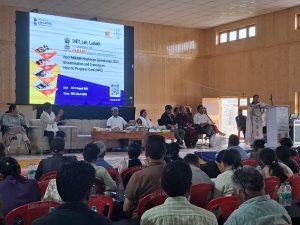DIET Leh, in collaboration with PARAKH, NCERT New Delhi, successfully organized a two-day orientation program on the Holistic Progress Card (HPC).

Leh,19 August 2025 : The District Institute of Education and Training (DIET) Leh, in collaboration with PARAKH, NCERT New Delhi, successfully organized a two-day orientation program on the Holistic Progress Card (HPC) for Headmasters and Examination In-charges of middle and high schools across Leh district on 18th and 19th August. The program marked an important step towards strengthening competency-based education in Ladakh, in line with the vision of the National Education Policy (NEP) 2020.
Day-1: Orientation and Policy Context.
The program waspersormally inaugurated by Ms. Bhanu Prabha, Secretary, School Education Department (SED), UT Ladakh, in the presence of senior officials, resource persons, and participants. In her inaugural address, she emphasized that the HPC represents a paradigm shift from traditional academic-centric evaluation towards a holistic approach that recognizes every child’s growth across cognitive, socio-emotional, physical, and creative domains. She expressed gratitude to PARAKH and NCERT for their technical support and called upon school leaders to adopt the HPC framework meaningfully in their institutions.
The first day focused on giving participants a deep understanding of the framework and philosophy of the HPC. Expert sessions led by the PARAKH team explained how the HPC is structured across all four stages of school education — Foundational, Preparatory, Middle, and Secondary. Participants were introduced to the ways in which the HPC integrates with the National Curriculum Framework (NCF-FS & SE) and how it aligns with NEP 2020’s larger vision of nurturing well-rounded individuals.
Discussions also highlighted how the upcoming PARAKH Rashtriya Sarvekshan 2024 will assess over 22 lakh students nationwide and generate evidence on learning outcomes, thereby complementing local implementation of the HPC in districts like Leh. A key message of Day-1 was that schools must move away from rote memorization and marks-based reporting to systems that capture competencies, creativity, problem-solving, and emotional growth.
Day-2: Hands-on Practice and Local Applications.
The second day shifted the focus to practical exercises and school-based applications. Resource persons delivered a detailed presentation on how the HPC can be applied in classrooms at different stages, after which participants engaged in group activities designed to simulate real-world use of the HPC.
Each group of schools worked on exercises such as credit allocation for student achievements, preparing sample progress cards, and identifying strategies to track growth in multiple domains. These activities gave participants first-hand experience in how the HPC can be used not just as a reporting tool, but as a guide for improving classroom practices.
Groups presented their outputs, leading to a lively exchange of ideas and clarification of doubts. Participants expressed that such activities helped them understand the practicality of shifting from purely academic scores to multi-dimensional profiles, and they recognized the need to train teachers under their supervision to ensure smooth implementation.
Policy Directions and Future Plans.
The valedictory session on Day-2 was graced by Ms. Bhanu Prabha, Secretary, SED, and Mr. Tsering Paldan, Director, SED. Both dignitaries lauded the participants’ active engagement and stressed that the learnings must be replicated and disseminated among teachers and staff across all schools.
The Secretary highlighted the importance of introducing a Ladakh Achievement Survey (LAS) once or twice every year, which would serve as a local mechanism to regularly monitor and improve student competencies. She explained that LAS would not only give schools feedback on learning progress but also help the administration design targeted interventions for improving classroom outcomes. The PARAKH team from NCERT assured full technical support to Ladakh in preparing question papers, conducting evaluations, and analyzing results for LAS
The Secretary also recommended that future workshops, particularly for Foundational and Preparatory stages, be organized for longer durations so that teachers at the critical early years receive deeper training. This, she noted, is essential because competency-based learning must be rooted in strong foundations, and it is in the early years that such reforms have the most lasting impact.
Closing
The two-day orientation concluded with the distribution of certificates of participation by the Secretary and the Director. In his closing remarks, Mr. Mirza Mehdi, Principal, DIET Leh, extended heartfelt thanks to the Chief Guests, the PARAKH-NCERT team, and the participants for their contribution to making the event a success. He emphasized that the orientation was not an end in itself, but the beginning of a larger reform in assessment practices in Ladakh.
Through this program, DIET Leh and PARAKH have laid the groundwork for a future where student learning will be measured in a holistic and meaningful manner, preparing children not only for academic success but also for life skills, creativity, and social responsibility.


